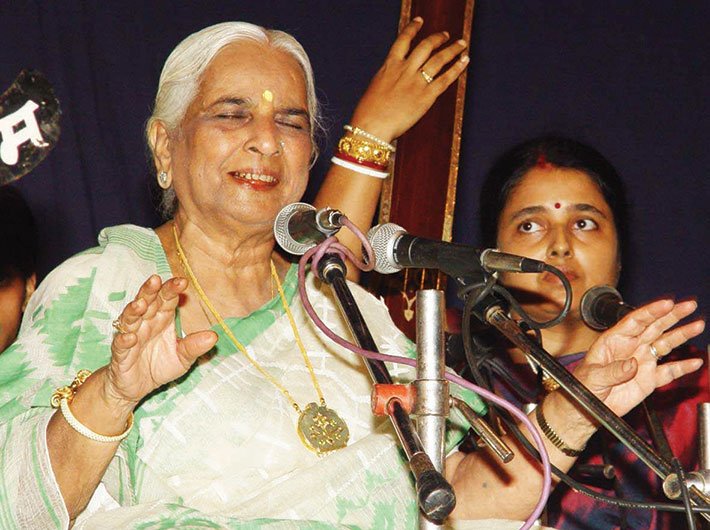Vocalist Girija Devi shares her thoughts on the future of folk-classical music, reality shows, fusion and why she is apprehensive about singing for films
Girija Devi is one of the finest classical and folk vocalists in the country. Born and brought up in Varanasi, she took forward the legacy of Benaras gharana and mastered semi-classical forms of music like thumri, kajri and tappa. She received Padma Vibhushan earlier this year. At 87, the Queen of Thumri as she is fondly called, shares her thoughts with Swati Chandra on the future of folk-classical music, reality shows, fusion and why she is apprehensive about singing for films.
You have won several accolades. The Padma Vibhushan this year is the most recent. What else you aspire for at 87?
Awards and accolades came and went. What has always been my yearning and continues to be an ambition is that my students take the rich tradition and gayaki [style of singing] of Benaras gharana forward in the years to come.
You started at a time when there were fewer women in the performing arts. Was it difficult for you to make your presence felt in a male-dominated field?
No, it wasn’t really that way. By the time I came into the performing music circuit, a lot of female performers had already made an impact. Kesarbai Kerkar, Mogubai Kurdikar, Hirabai Barodekar, Saraswati Rane, Manik Verma, Siddheshwari Devi, Rasoolan Bai and Begum Akhtar were my contemporaries. I never faced any major difficulty because I started performing with the permission and blessings of my elders who were my inspiration. Ravi Shankar dada and Ali Akbar bhai were extremely supportive of me and had a lot of faith in my abilities and my prospects as a musician.
Benaras gharana, where you learnt the first notes of music, is witnessing migration of its people. Performing artists are going to metro cities to earn a livelihood. Do you think this trend will remove Varanasi from the map of music?
No, it will not be removed. Many different genres of music have been introduced like fusion, bands and qawwalis. People these days do not have much time. Listeners don’t have hours to invest in a classical performance. Artists across the world are trying to create a career out of their music, so there tends to be some dilution of music. But where do you find complete purity in anything anymore? Even food has the concept of fusion in it. These days people want to move out of traditional practices and try out different things and I don’t have any objection to that. However, I, as an artist, have never diluted my gayaki which I have inherited from my gharana. I consider it to be my identity.
Over the years, music has evolved. Classical forms of music like khayal, tappa and thumri are fading away. Young people are not interested in folk genres that have been enriching our music for long. Where do you see the future of folk and classical music, especially thumri, 10 years from now?
My listeners and disciples are all very respectful and proud of the rich repertoire of the forms of classical music. My disciples are passionate musicians, who are working hard not only to maintain but also to take forward this lineage of music. I am confident that these forms will remain alive for several years through them in the same guru-shishya parampara. Many Indian classical music listeners are well aware of the differences between khayal, thumri, kajri, tappa, dadra, holi and chaiti, and it is not easy to have all of these fade away in 10 years! The gayaki of Kashi is ‘chau-mukhi’ which includes dhrupad, dhamaar, khayal, thumri, kajri, tappa, holi and folk music. It should be noted that all these forms have classical music in them; they have a tradition and history. It is not just music from the villages.
Furthermore, change is constant. From time to time, there will be minor changes in tastes and preferences of people, which is natural. However, my music is my responsibility and I will always stand strong to take it forward. This is my ultimate satisfaction because I know that this lineage, which my gurus have created, will last for a long time – more or less, but it will last.
Are remixes and fusion adulterating classical music?
No. How I look at it is that if musicians feel that the inclusion of four-five extra instruments will enhance the beauty of a composition, it isn’t a problem. Even in earlier times, sarangi, tanpura, tabla, shehnai and bansuri used to be included in performances and vocal renditions. Harmonium is a western instrument, and so is guitar. These are not bad inclusions.
However, changing a 100-year-old traditional composition, changing the tune or lyrics is something that I don’t support. How would it sound if we sing a western classical composition using Indian classical notes or instrumental accompaniment? Would that be accepted? I support alternative choices of instrumentalisation like the use of piano in place of harmonium, guitars in place of sarod or mandolin in place of sitar. What worries me is the lack of purity. If a composition is in Russian, it should be respected and the purity must be maintained and not be merged with Indian notes. The same goes with English compositions and Indian classical music compositions. Tampering the purity is something I feel strongly about.
Despite being a celebrated classical vocalist, you didn’t sing for films. Why?
In my initial days in music, I toured with Ustad Amir Khan saheb and DV Paluskar-ji. At that time, Amir Khan saheb had sung for the film, Baiju Bawra. During those tours, despite brilliant, full-fledged classical performances, the audience used to request him to sing those film songs. Similarly, Ustad Bismillah Khan saheb used to get requests for playing pieces from Goonj Uthi Shehnai after performing for hours at a classical music concert. They used to be distressed with such requests. This instilled a sort of apprehension and fear inside me. I wondered why anyone would want to listen to a four-five minute song after a complete classical music performance. I felt that these requests were disrespecting the performance. During that time, a movie ticket costed Rs 5. Why not get a ticket and watch the movie and listen to those songs? Why mix both when the concert is for pure classical music? This trend kept me away from the film industry.
Your opinion on reality shows?
Thousands of children audition for reality shows and after rigorous assessment, only 10-15 are selected, considered to be the best in the country. But to select only one winner out of them, giving them a huge amount of money and luxuries is a little irresponsible. After this felicitation, nobody keeps a track of what these children do with their music or where they are training. This is the reason why several reality show winners disappear after a year of name and fame. If the same amount of money is invested on their training, it would be a true recognition of their talent. The focus should be on connecting them to the industry and to good music directors and trainers who can take their career ahead.
The current trend is not just detrimental to that one person who was once a winner, but is also heart breaking and demotivating for the other 10-14 singers who were considered equally potent in the journey of being the best. If all the 15 are capable of being quality musicians, they must all be invested upon, why just one?
You grew up in Varanasi. What do you miss about it the most when you are away from it?
[Laughs] what I miss most is the food! Pure milk, malai, thandai and maghai paan of Varanasi. The fresh produce is not available anywhere else. The feeling of being at home and going to the Ganges, I miss that.
(Transcription by Shoumi Roy)
[email protected]
(The interview appears in the June 16-31, 2016 issue of Governance Now)

